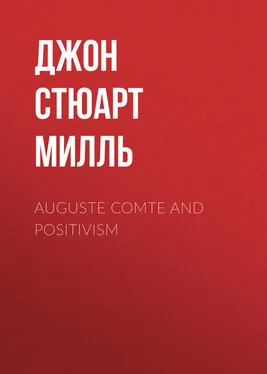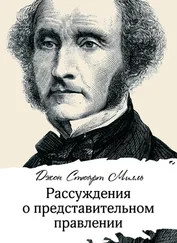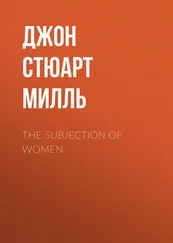Джон Милль - Auguste Comte and Positivism
Здесь есть возможность читать онлайн «Джон Милль - Auguste Comte and Positivism» — ознакомительный отрывок электронной книги совершенно бесплатно, а после прочтения отрывка купить полную версию. В некоторых случаях можно слушать аудио, скачать через торрент в формате fb2 и присутствует краткое содержание. Жанр: Философия, literature_19, foreign_antique, foreign_prose, на английском языке. Описание произведения, (предисловие) а так же отзывы посетителей доступны на портале библиотеки ЛибКат.
- Название:Auguste Comte and Positivism
- Автор:
- Жанр:
- Год:неизвестен
- ISBN:нет данных
- Рейтинг книги:4 / 5. Голосов: 1
-
Избранное:Добавить в избранное
- Отзывы:
-
Ваша оценка:
- 80
- 1
- 2
- 3
- 4
- 5
Auguste Comte and Positivism: краткое содержание, описание и аннотация
Предлагаем к чтению аннотацию, описание, краткое содержание или предисловие (зависит от того, что написал сам автор книги «Auguste Comte and Positivism»). Если вы не нашли необходимую информацию о книге — напишите в комментариях, мы постараемся отыскать её.
Auguste Comte and Positivism — читать онлайн ознакомительный отрывок
Ниже представлен текст книги, разбитый по страницам. Система сохранения места последней прочитанной страницы, позволяет с удобством читать онлайн бесплатно книгу «Auguste Comte and Positivism», без необходимости каждый раз заново искать на чём Вы остановились. Поставьте закладку, и сможете в любой момент перейти на страницу, на которой закончили чтение.
Интервал:
Закладка:
According to M. Comte, chemistry entered into the positive stage with Lavoisier, in the latter half of the last century (in a subsequent treatise he places the date a generation earlier); and biology at the beginning of the present, when Bichat drew the fundamental distinction between nutritive or vegetative and properly animal life, and referred the properties of organs to the general laws of the component tissues. The most complex of all sciences, the Social, had not, he maintained, become positive at all, but was the subject of an ever-renewed and barren contest between the theological and the metaphysical modes of thought. To make this highest of the sciences positive, and thereby complete the positive character of all human speculations, was the principal aim of his labours, and he believed himself to have accomplished it in the last three volumes of his Treatise. But the term Positive is not, any more than Metaphysical, always used by M. Comte in the same meaning. There never can have been a period in any science when it was not in some degree positive, since it always professed to draw conclusions from experience and observation. M. Comte would have been the last to deny that previous to his own speculations, the world possessed a multitude of truths, of greater or less certainty, on social subjects, the evidence of which was obtained by inductive or deductive processes from observed sequences of phaenomena. Nor could it be denied that the best writers on subjects upon which so many men of the highest mental capacity had employed their powers, had accepted as thoroughly the positive point of view, and rejected the theological and metaphysical as decidedly, as M. Comte himself. Montesquieu; even Macchiavelli; Adam Smith and the political economists universally, both in France and in England; Bentham, and all thinkers initiated by him, – had a full conviction that social phaenomena conform to invariable laws, the discovery and illustration of which was their great object as speculative thinkers. All that can be said is, that those philosophers did not get so far as M. Comte in discovering the methods best adapted to bring these laws to light. It was not, therefore, reserved for M. Comte to make sociological inquiries positive. But what he really meant by making a science positive, is what we will call, with M. Littré, giving it its final scientific constitution; in other words, discovering or proving, and pursuing to their consequences, those of its truths which are fit to form the connecting links among the rest: truths which are to it what the law of gravitation is to astronomy, what the elementary properties of the tissues are to physiology, and we will add (though M. Comte did not) what the laws of association are to psychology. This is an operation which, when accomplished, puts an end to the empirical period, and enables the science to be conceived as a co-ordinated and coherent body of doctrine. This is what had not yet been done for sociology; and the hope of effecting it was, from his early years, the prompter and incentive of all M. Comte's philosophic labours.
It was with a view to this that he undertook that wonderful systematization of the philosophy of all the antecedent sciences, from mathematics to physiology, which, if he had done nothing else, would have stamped him, in all minds competent to appreciate it, as one of the principal thinkers of the age. To make its nature intelligible to those who are not acquainted with it, we must explain what we mean by the philosophy of a science, as distinguished from the science itself. The proper meaning of philosophy we take to be, what the ancients understood by it – the scientific knowledge of Man, as an intellectual, moral, and social being. Since his intellectual faculties include his knowing faculty, the science of Man includes everything that man can know, so far as regards his mode of knowing it: in other words, the whole doctrine of the conditions of human knowledge. The philosophy of a Science thus comes to mean the science itself, considered not as to its results, the truths which it ascertains, but as to the processes by which the mind attains them, the marks by which it recognises them, and the co-ordinating and methodizing of them with a view to the greatest clearness of conception and the fullest and readiest availibility for use: in one word, the logic of the science. M. Comte has accomplished this for the first five of the fundamental sciences, with a success which can hardly be too much admired. We never reopen even the least admirable part of this survey, the volume on chemistry and biology (which was behind the actual state of those sciences when first written, and is far in the rear of them now), without a renewed sense of the great reach of its speculations, and a conviction that the way to a complete rationalizing of those sciences, still very imperfectly conceived by most who cultivate them, has been shown nowhere so successfully as there.
Конец ознакомительного фрагмента.
Текст предоставлен ООО «ЛитРес».
Прочитайте эту книгу целиком, купив полную легальную версию на ЛитРес.
Безопасно оплатить книгу можно банковской картой Visa, MasterCard, Maestro, со счета мобильного телефона, с платежного терминала, в салоне МТС или Связной, через PayPal, WebMoney, Яндекс.Деньги, QIWI Кошелек, бонусными картами или другим удобным Вам способом.
1
See the Chapter on Efficient Causes in Reid's "Essays on the Active Powers," which is avowedly grounded on Newton's ideas.
2
Mr Herbert Spencer, who also distinguishes between abstract and concrete sciences, employs the terms in a different sense from that explained above. He calls a science abstract when its truths are merely ideal; when, like the truths of geometry, they are not exactly true of real things – or, like the so-called law of inertia (the persistence in direction and velocity of a motion once impressed) are "involved" in experience but never actually seen in it, being always more or less completely frustrated. Chemistry and biology he includes, on the contrary, among concrete sciences, because chemical combinations and decompositions, and the physiological action of tissues, do actually take place (as our senses testify) in the manner in which the scientific propositions state them to take place. We will not discuss the logical or philological propriety of either use of the terms abstract and concrete, in which twofold point of view very few of the numerous acceptations of these words are entirely defensible: but of the two distinctions M. Comte's answers to by far the deepest and most vital difference. Mr Spencer's is open to the radical objection, that it classifies truths not according to their subject-matter or their mutual relations, but according to an unimportant difference in the manner in which we come to know them. Of what consequence is it that the law of inertia (considered as an exact truth) is not generalized from our direct perceptions, but inferred by combining with the movements which we see, those which we should see if it were not for the disturbing causes? In either case we are equally certain that it is an exact truth: for every dynamical law is perfectly fulfilled even when it seems to be counteracted. There must, we should think, be many truths in physiology (for example) which are only known by a similar indirect process; and Mr Spencer would hardly detach these from the body of the science, and call them abstract and the remainder concrete.
Читать дальшеИнтервал:
Закладка:
Похожие книги на «Auguste Comte and Positivism»
Представляем Вашему вниманию похожие книги на «Auguste Comte and Positivism» списком для выбора. Мы отобрали схожую по названию и смыслу литературу в надежде предоставить читателям больше вариантов отыскать новые, интересные, ещё непрочитанные произведения.
Обсуждение, отзывы о книге «Auguste Comte and Positivism» и просто собственные мнения читателей. Оставьте ваши комментарии, напишите, что Вы думаете о произведении, его смысле или главных героях. Укажите что конкретно понравилось, а что нет, и почему Вы так считаете.











